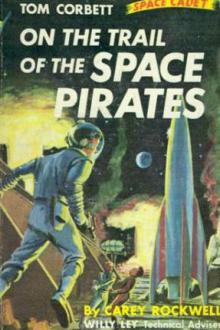Triplanetary, E. E. Smith [reading like a writer TXT] 📗

- Author: E. E. Smith
Book online «Triplanetary, E. E. Smith [reading like a writer TXT] 📗». Author E. E. Smith
The three Earth-people seized whatever supports were at hand as the Nevian spaceship struck the water with undiminished speed, but the precaution was needless—Nerado knew thoroughly his vessel, its strength and its capabilities. There was a mighty splash, but that was all. The artificial gravity was unchanged by the impact; to the passengers the vessel was still motionless and on even keel as, now a submarine, she snapped around like a very fish and attacked the rear of the nearest fortress.
For fortresses they were; vast structures of green metal, plowing forward implacably upon immense caterpillar treads. And as they crawled they destroyed, and Costigan, exploring the strange submarine with his visiray beam, watched and marveled. For the fortresses were full of water; water artificially cooled and aerated, entirely separate from the boiling flood through which they moved. They were manned by fish some five feet in length. Fish with huge, goggling eyes; fish plentifully equipped with long, armlike tentacles; fish poised before control panels or darting about intent upon their various duties. Fish with brains, waging war!
Nor was their warfare ineffectual. Their heat-rays boiled the water for hundreds of yards before them and their torpedoes were exploding against the Nevian defenses in one appallingly continuous concussion. But most potent of all was a weapon unknown to Triplanetary warfare. From a fortress there would shoot out, with the speed of a meteor, a long, jointed, telescopic rod; tipped with a tiny, brilliantly-shining ball. Whenever that glowing tip encountered any obstacle, that obstacle disappeared in an explosion world-wracking in its intensity. Then what was left of the rod, dark now, would be retracted into the fortress-only to emerge again in a moment with a tip once more shining and potent.
Nerado, apparently as unfamiliar with the peculiar weapon as were the Terrestrials, attacked cautiously; sending out far to the fore his murkily impenetrable screens of red. But the submarine was entirely non-ferrous, and its officers were apparently quite familiar with Nevian beams which licked at and clung to the green walls in impotent fury. Through the red veil came stabbing ball after ball, and only the most frantic dodging saved the spaceship from destruction in those first few furious seconds. And now the Nevian defenders of the Third City had secured and were employing the vast store of allotropic iron so opportunely delivered by Nerado.
From the city there pushed out immense nets of metal, extending from the surface of the ocean to its bottom; nets radiating such terrific forces that the very water itself was beaten back and stood motionless in vertical, glassy walls. Torpedoes were futile against that wall of energy. The most fiercely driven rays of the fishes flamed incandescent against it, in vain. Even the incredible violence of a concentration of every available force-ball against one point could not break through. At that unimaginable explosion water was hurled for miles. The bed of the ocean was not only exposed, but in it there was blown a crater at whose dimensions the Terrestrials dared not even guess. The crawling fortresses themselves were thrown backward violently and the very world was rocked to its core by the concussion, but that iron-driven wall held. The massive nets swayed and gave back, and tidal waves hurled their mountainously destructive masses through the Third City, but the mighty barrier remained intact. And Nerado, still attacking two of the powerful tanks with his every weapon, was still dodging those flashing balls charged with the quintessence of destruction. The fishes could not see through the sub-ethereal veil, but all the gunners of the two fortresses were combing it thoroughly with ever-lengthening, ever-thrusting rods, in a desperate attempt to wipe out the new and apparently all-powerful Nevian submarine whose sheer power was slowly but inexorably crushing even their gigantic walls.
“Well, I think that right now’s the best chance we’ll ever have of doing something for ourselves.” Costigan turned away from the absorbing scenes pictured upon the visiplate and faced his two companions.
“But what can we possibly do?” asked Clio.
“Whatever it is, we’ll try it!” Bradley exclaimed.
“Anything’s better than staying here and letting them analyze us—no telling what they’d do to us,” Costigan went on.
“I know a lot more about things than they think I do. They never did catch me using my spy-ray—it’s on an awfully narrow beam, you know, and uses almost no power at all—so I’ve been able to dope out quite a lot of stuff. I can open most of their locks, and I know how to run their small boats. This battle, fantastic as it is, is deadly stuff, and it isn’t one-sided, by any means, either, so that every one of them, from Nerado down, seems to be on emergency duty. There are no guards watching us, or stationed where we want to go—our way out is open. And once out, this battle is giving us our best possible chance to get away from them. There’s so much emission out there already that they probably couldn’t detect the driving force of the lifeboat, and they’ll be too busy to chase us, anyway.”
“Once out, then what?” asked Bradley.
“We’ll have to decide that before we start, of course. I’d say make a break back for Earth. We know the direction and we’ll have plenty of power.”
“But good Heavens, Conway, it’s so far!” exclaimed Clio. “How about food, water, and air—would we ever get there?”
“You know as much about that as I do. I think so, but of course anything might happen. This ship is none too big, is considerably slower than the big spaceship, and we’re a long ways





Comments (0)